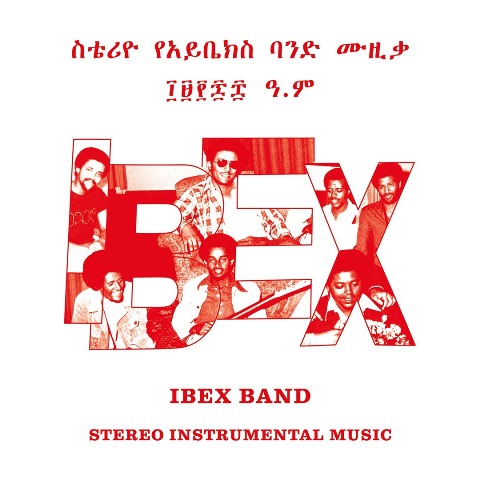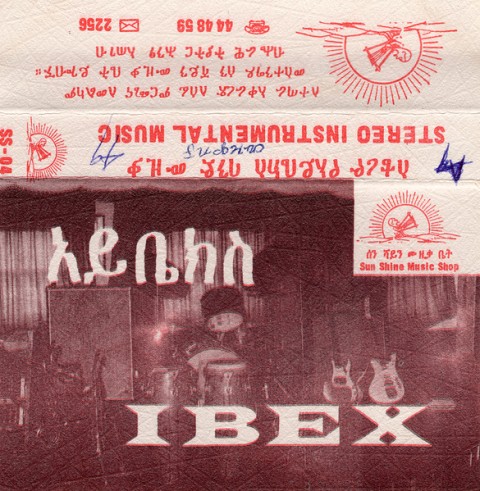Stereo Instrumental Music was recorded in July 1976 and originally issued only on cassette. The release was organised by what was credited as the “Sun Shine Music Shop,” an enterprise which seems to have left no additional imprint. No further “Sun Shine Music Shop” albums are known.
In contrast, Ibex Band, the outfit which recorded Stereo Instrumental Music, had a lineage outstripping that of the label which released the album. In 1975, they had issued an album and four related singles where they backed established vocalist Mahmoud Ahmed. They also backed Aster Aweke on one of her early albums. Ibex Band could be, so to speak, a backing band which was on call. The outfit’s flute and sax players Fekadu Amdemeskel and Tedros Mitiku, and drummer Tesfaye Mekonen all had pasts embedding them in Ethiopia’s music scene: they were former members of The Soul Ekos, who were active from the late Sixties.
 Looking forward, for some of its members Ibex Band was a way station. After Ibex Band split in 1979, Giovanni Rico (bass), Selam Woldemariam (lead guitar) and Fekadu Amdemeskel immediately formed Roha Band, which called it a day in 1993. Throughout, Rico continued playing with Mahmoud Ahmed.
Looking forward, for some of its members Ibex Band was a way station. After Ibex Band split in 1979, Giovanni Rico (bass), Selam Woldemariam (lead guitar) and Fekadu Amdemeskel immediately formed Roha Band, which called it a day in 1993. Throughout, Rico continued playing with Mahmoud Ahmed.
While Ibex Band and its members were integral to Ethiopia’s music, the related local infrastructure was limited. Playing live would keep a band going – Ibex Band had residencies at Addis Ababa's Ghion and Ras hotels – but there were few record labels. Amha Records was active between 1969 and 1975 and Kaifa Records was a going concern between 1973 and 1977 (much of what’s on the Éthiopiques series of compilations draws from the two label’s catalogues). Do-it-yourself was often the default option.
In this spirit, when Ibex Band got the opportunity to record in 1976 the arrangements were necessarily ad hoc – they had to be due the constrictions of operating under the restrictive, unpredictable Derg regime and the curfew it imposed. A radio station named The Voice of Gospel Radio had four-track recording equipment – the only such set-up in Ethiopia – which was brought to the Ras to tape what would become Stereo Instrumental Music. The equipment was operated by Karl-Gustav Lundgren, a Swede who was working with the Ethiopian Evangelical Church. It took 15 minutes to arrange the microphones, after which the band recorded eight of the album’s 12 tracks. It was done in secret, and had to be completed by midnight so no one would be caught breaching the curfew. Four more tracks were recorded soon after in the same setting, but without Lundgren. True to what would be chosen as the album’s title, it was an instrumental set and, due to the recording equipment, it was in stereo.
 The band which recorded Stereo Instrumental Music was Fekadu Amdemeskel (flute and sax), Girma Chibsa (congas), Dereje Mekonen (keyboards), Tesfaye Mekonen (drums), Tedros Mitiku (flute and sax), Giovanni Rico (bass) and Selam Woldemariam (guitar). (pictured left, the card insert from the original 1976 cassette release of Stereo Instrumental Music)
The band which recorded Stereo Instrumental Music was Fekadu Amdemeskel (flute and sax), Girma Chibsa (congas), Dereje Mekonen (keyboards), Tesfaye Mekonen (drums), Tedros Mitiku (flute and sax), Giovanni Rico (bass) and Selam Woldemariam (guitar). (pictured left, the card insert from the original 1976 cassette release of Stereo Instrumental Music)
Despite the guerrilla-style nature of the album’s recording, the performances are very tight. This is a well-drilled band. What’s captured is cosmopolitan as such. Consequently, it resists easy categorisation. The drums are to the fore, especially the constant trade-off between the snare and hi-hat. Add in circular, looping bass lines and Ibex Band’s groove is defined. On third track “Zerafewa” the interplay highlights the 6/8 time signature, which has the effect of adding impetus to what, overall, is otherwise a drifting, leisurely performance. The album is slanted towards jazz – especially when the flutes take the lead melody lines – but this is contrasted with a marked Stax soul feel, evident on “Yene F’qr Skaysi “ and “Y’ke’al’yu.” If each had a vocal line, both would work well as yearning soul ballads. “Shemonmuanaye” is less straightforward, its calliope-like structure positing it as the soundtrack to a filmic depiction of a bad dream. On “Ay w’bet,” Woldemariam’s wandering guitar nods towards blues, hinting at a familiarity with 1968/1969 Peter Green.
Stereo Instrumental Music became a form of full stop. Although they backed Mahmoud Ahmed on his 1978 Jeguol Naw Betwa album, there were no more Ibex Band albums. Roha Band followed in 1979 and, ultimately, Selam Seyoum and Fekade Amde Maskal settled in America. Stereo Instrumental Music was a snapshot of a particular moment in Ethiopia’s music – freeze-framing a band with its own take on what should be brought on board to follow its own musical path.
- Next week: The three CDs of Motor City Is Burning - A Michigan Anthology 1965-1972
- More reissue reviews on theartsdesk
- Kieron Tyler’s website















Add comment